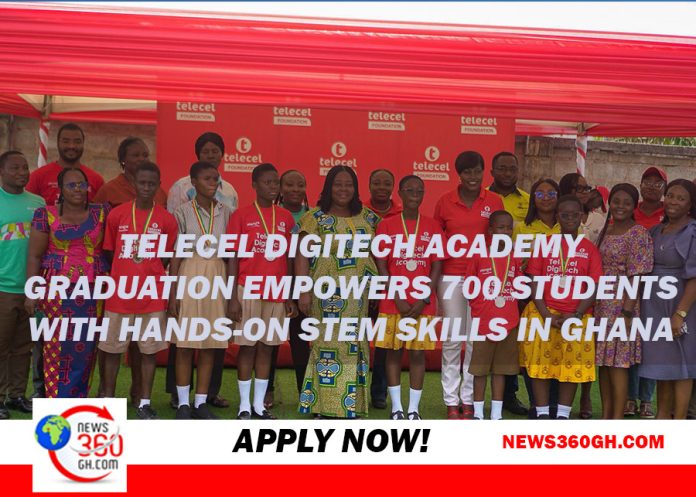Over 700 junior high school students from 38 schools across six regions in Ghana have successfully completed twelve weeks of intensive practical training as part of the Telecel Digitech Academy graduation. The initiative, spearheaded by the Telecel Ghana Foundation in partnership with Mingo Foundation and Asustem Robotics, equips young learners with essential coding, robotics, website design, and computer programming skills aligned with the Ghana Education Service (GES) curriculum. By prioritising hands-on experience and inclusivity, this programme is helping to build Ghana’s future workforce for a technology-driven economy.
Empowering the Next Generation with STEM Training in Ghana
The Telecel Digitech Academy is designed to deliver high-quality STEM training in Ghana for junior high school students. By aligning with the GES curriculum throughout the academic term, the programme ensures that students develop relevant, real-world skills while supporting their regular schoolwork.
Participating schools from Greater Accra, Volta, Ashanti, North East, Bono East, and Western Regions benefited from weekly practical training sessions delivered after school by experienced facilitators. These sessions focused on problem-solving, creativity, and designing technology solutions for real-world challenges.
Practical Coding, Robotics, and Tech Skills for JHS Students
Over twelve weeks, students gained skills in:
-
Coding and computer programming
-
Robotics and automation
-
Website design and development
-
Developing devices to solve everyday problems
The goal was to transform traditional classroom learning with interactive, hands-on training that prepares students for the demands of the modern digital economy.
Closing Ceremonies Showcase Innovative Student Projects
During regional closing ceremonies, students demonstrated the skills they had acquired by presenting innovative projects such as:
-
Smart waste management systems
-
Automated railway gates
-
Smart spectacles designed for the visually impaired
-
Automated height-recording systems
-
Advanced water conservation technologies
These solutions highlighted the students’ creativity and their ability to address local challenges through technology.
Commitment to Gender Inclusivity in STEM Education
A standout feature of the Academy was its deliberate focus on closing the gender gap in STEM fields. An impressive 70% of participating learners were girls, showcasing the programme’s commitment to inclusivity and empowerment of young women in technology.
Mrs Bernice Ofori, Tema Metropolitan Director of Education, noted:
“The well-structured approach engaged our young learners in hands-on activities which supplemented our traditional classroom learning. The Telecel Digitech Academy is a real game changer for inclusivity by empowering our youth in the digital economy and ensuring that 70 per cent of the learners are girls, addressing the gender gap in the field.”
Quotes from Telecel Ghana Foundation and GES Officials
Dr Stella Agyenim-Boateng, Board Member of the Telecel Ghana Foundation, praised the initiative:
“The Academy shows the Foundation’s dedication to preparing the next generation with important skills for an innovation-driven future, technology, and transformation.”
Rita Agyeiwaa Rockson, Head of Foundation, Sustainability and External Communications at Telecel Ghana, added:
“The initiative is specifically aimed at bridging the digital gap through the provision of young Ghanaians with access to training in emerging technologies.”
FAQs about the Telecel Digitech Academy
Q: What is the Telecel Digitech Academy?
A: A practical training programme in coding, robotics, website design, and computer programming for junior high school students in Ghana.
Q: How many students benefited from the programme?
A: 700 students from 38 schools across six regions completed the training.
Q: Which regions were involved?
A: Greater Accra, Volta, Ashanti, North East, Bono East, and Western Regions.
Q: How does the programme address gender imbalance in STEM?
A: By ensuring 70% of participants are girls, the programme actively promotes inclusivity in technology education.
Q: Who are the partners in this initiative?
A: Telecel Ghana Foundation, Mingo Foundation, Asustem Robotics, and the Ghana Education Service.
Call to Action: Bridging Ghana’s Digital Gap
The Telecel Digitech Academy is a powerful model for empowering the next generation with essential technology skills. To learn more about Telecel Ghana Foundation’s work or explore how to support STEM training for Ghanaian students, visit the Telecel Ghana website or contact your local education office for partnership opportunities.



https://t.me/s/officials_pokerdom/3648